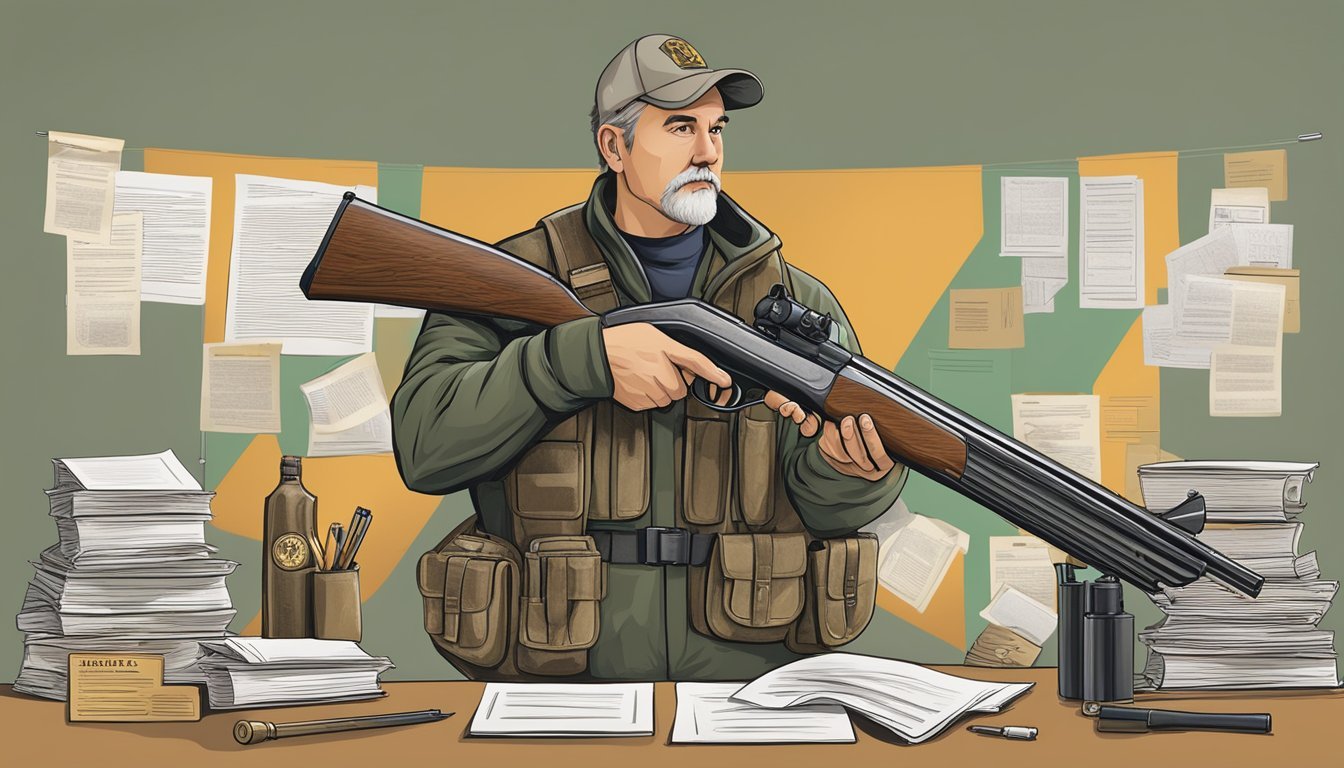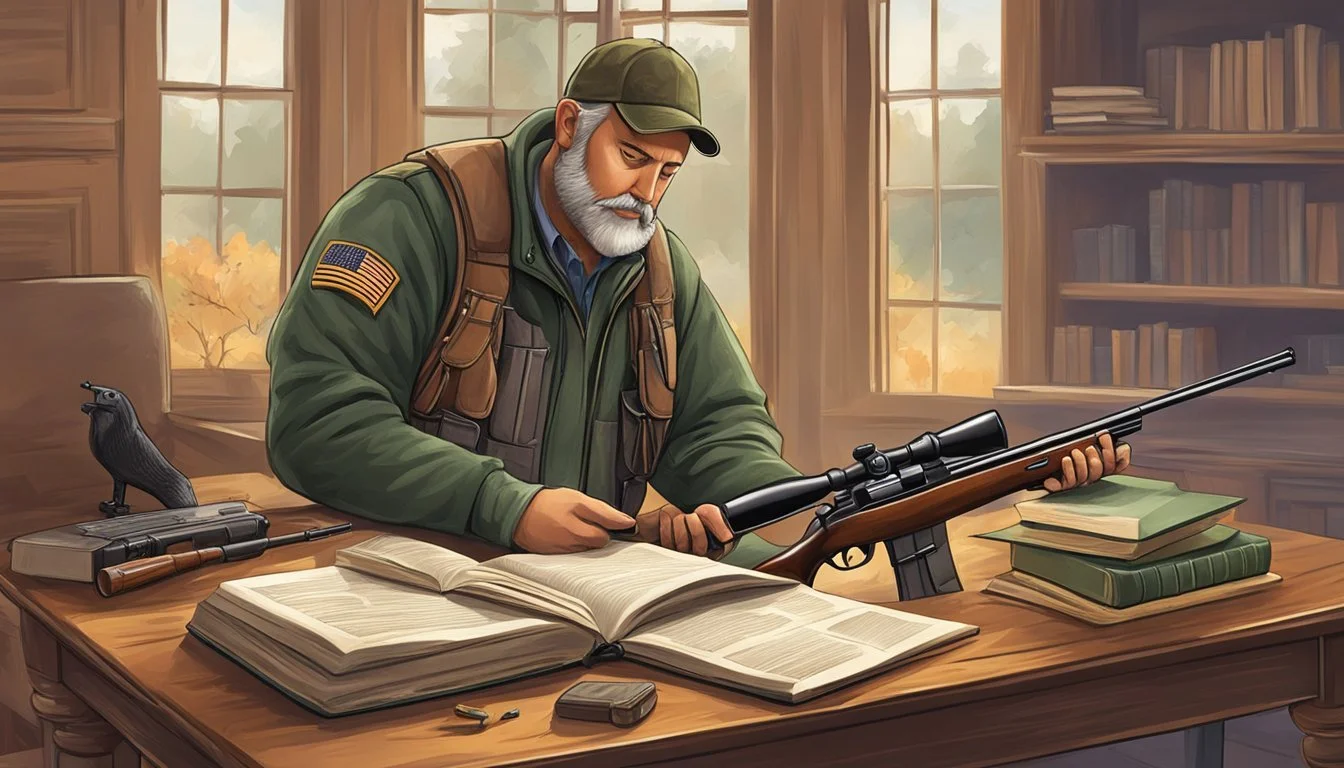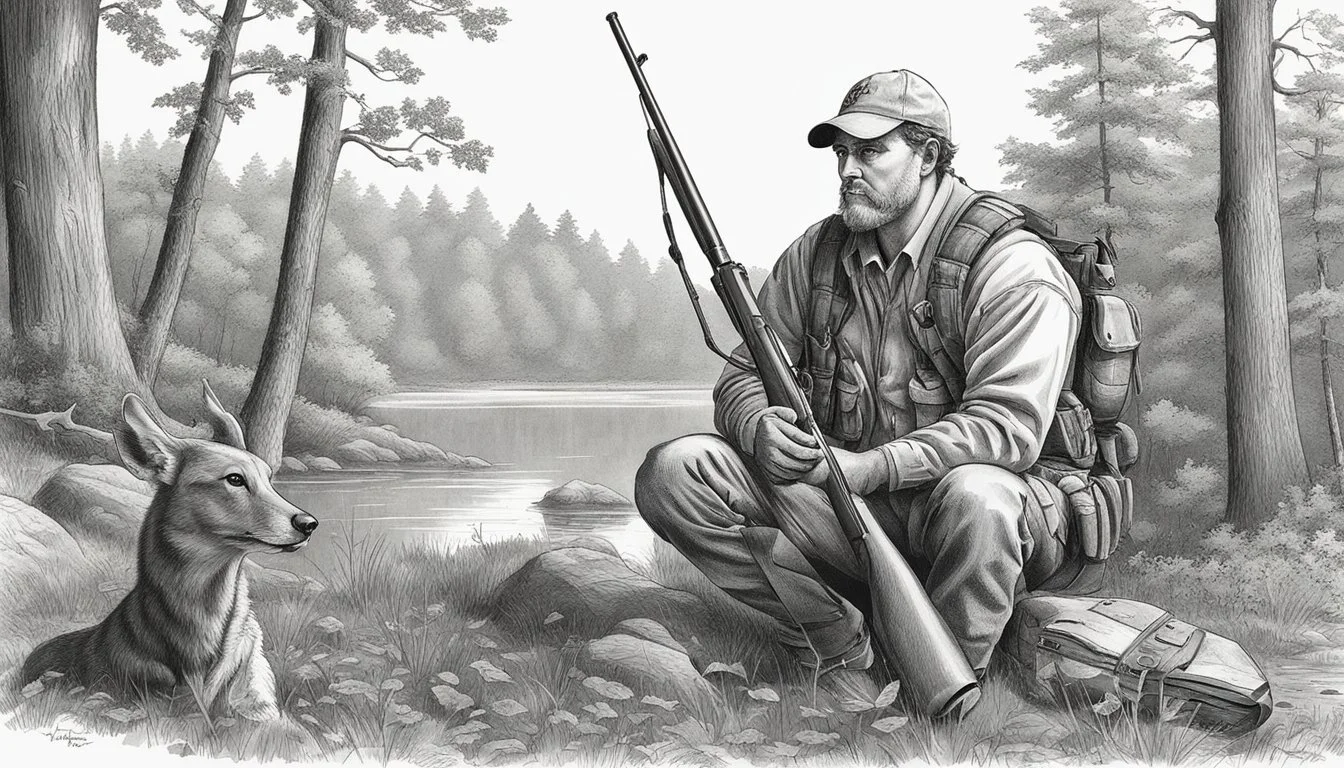Gun Laws in Maryland for Hunters
A Comprehensive Guide
Maryland's gun laws are comprehensive, guiding hunters and firearm enthusiasts in responsible and legal firearm usage. The state imposes specific statutes that every hunter must adhere to, impacting when, where, and how they can hunt with firearms. For instance, Maryland does not require permits for the purchase of rifles or shotguns, which are the primary firearms used for hunting. However, safety zones are established to protect non-hunters, and it is illegal to discharge a firearm within 150 yards of any occupied building or camp without explicit permission from the owner or occupant, with an exception for archery hunters in certain counties.
Hunters in Maryland must also comply with hunting seasons and bag limits for all game species, which are clearly outlined in the state's hunting regulations. Depending on the hunting activity, they may need to obtain the appropriate licenses, stamps, and permits. These requirements serve to maintain wildlife populations and ensure that hunters contribute to conservation efforts. Moreover, the state takes the position of gun safety and proper handling seriously, providing resources and education for gun owners on responsible practices, especially when carrying firearms in public.
It's crucial for hunters to understand that despite a level of preemption in the state's approach to firearm and ammunition regulations, Maryland maintains a stringent prohibition on felons possessing firearms. This is strictly enforced, with severe penalties for non-compliance. This reflects Maryland's commitment to preventing gun violence by restricting access for those with felony convictions. Hunting regulations, therefore, balance the tradition and sport of hunting with measures aimed at public safety and wildlife management.
Overview of Maryland Gun Laws
Maryland's gun laws are among the most stringent in the United States. The State of Maryland exercises preemption over firearm and ammunition regulation, meaning local governments cannot enact laws that conflict with state law.
At the federal level, individuals are subject to background checks and applicable federal restrictions. Maryland state law requires additional regulations:
Handgun Ownership: Individuals must obtain a Handgun Qualification License (HQL) by submitting fingerprints and completing a safety course.
Assault Weapons: Owning assault weapons in Maryland is prohibited under the Firearm Safety Act of 2013.
Permits and Licenses: The state has shifted from a "may-issue" to a "shall-issue" state for conceal carry permits post-NYSRPA v Bruen.
Carrying Firearms: To carry a handgun, individuals need a wear and carry permit, which requires thorough justification for carrying the firearm.
Firearm Transactions: No permit is required to purchase rifles and shotguns.
Restrictions: Felons are permanently banned from possessing firearms unless pardoned by the governor.
When it comes to hunting, understanding these regulations is essential. Hunters are expected to follow all state and federal laws while engaging in their activities. This includes restrictions on the type of firearms allowed and the necessity of proper documentation and licenses. Compliance ensures both the safety and legality of hunting practices within Maryland.
Firearm Ownership Requirements
In Maryland, hunters looking to own firearms must navigate an established process that includes obtaining a Handgun Qualification License and completing a Firearms Safety Training Course. These prerequisites ensure responsible ownership and adherence to state regulations.
Background Checks and Handgun Qualification License
To purchase a handgun in Maryland, prospective owners must obtain a Handgun Qualification License (HQL), which requires a state and federal background check. This background check scrutinizes criminal history, mental health records, and other relevant information to determine eligibility. Permits are not required for the purchase of rifles or shotguns.
The HQL necessitates:
A submitted application to the Maryland State Police.
Fingerprints provided for a background check.
Fees associated with processing and fingerprinting.
The issuance of the HQL is a critical step for those interested in handgun ownership, and it must be renewed accordingly.
Firearms Safety Training Course
Owners must complete a Firearms Safety Training Course before they are eligible to apply for a regulated firearm. This course emphasizes the secure handling and storage of firearms and is mandatory for all first-time regulated firearm purchasers.
Key components of the course include:
A minimum of 4 hours of instruction.
Safe handling, operation, and storage of firearms.
State firearm law and home firearm safety.
Mechanisms of firearms and operation.
Once completed, individuals must submit certification of their training with their ownership application. This requirement is designed to ensure that all firearm owners have a baseline understanding of firearm safety and applicable laws.
Carrying and Transportation of Firearms
Hunting in Maryland requires understanding the state's specific laws governing how firearms are carried and transported. Comprehension of these rules ensures compliance with legal standards and promotes safe hunting practices.
Open Carry and Concealed Carry Laws
Maryland law generally prohibits the open carry and concealed carry of handguns unless an individual has obtained the necessary permits. Exceptions to these prohibitions include activities such as hunting and target shooting, where carrying a firearm is intrinsic to the activity.
Exceptions include:
Organized military activities
Target shoots
Hunting
Department of Natural Resources-sponsored events
Transportation in Vehicle
The transportation of a handgun in a vehicle without a carry permit is heavily regulated in Maryland. Firearms must be unloaded and stored in a compartment separate from any ammunition. An individual is allowed to transport a firearm in their vehicle if they are driving between permitted areas, such as from their residence to a place where they can legally hunt.
The firearm should be transported as follows:
Unloaded
In a case or compartment separate from ammunition
Between residence and locations where possession is allowed
Carry Permits and Restrictions
To legally carry a handgun in Maryland, an individual must possess a valid carry permit. Obtaining a permit requires meeting eligibility criteria, including demonstration of a good and substantial reason to carry a firearm. Hunting is considered a valid reason to transport a firearm, but it does not necessarily justify the granting of a carry permit for carrying outside of hunting activities.
Carry permits are required for:
Carrying a handgun openly or concealed
Transportation of a loaded firearm in certain circumstances
Restrictions without permit:
Carrying, open or concealed, is generally not permitted in public places
Transporting a loaded firearm is prohibited without specific authorization
Hunting Regulations and Firearms
Maryland enforces specific hunting regulations and firearm laws to ensure safety and conservation. Hunters must adhere to these rules which cover the types of permissible firearms and ammunition, licensing requirements, and season-specific regulations.
Legal Hunting Firearms and Ammunition
Deer Hunting: For deer hunting during the Firearms Season, hunters may use any legal firearm, muzzleloader, air gun, or archery equipment. The choice of weapon must abide by the season's bag limits.
Archery:
Archery equipment is permitted with a safety zone of 50 yards from occupied buildings in Wicomico and Worcester Counties.
Firearms and Ammunition:
Shotguns, rifles, and handguns with appropriate ammunition are permitted, with restrictions varying per animal and season.
Non-toxic shot must be used for waterfowl hunting, while larger caliber ammunition is typically required for larger game like deer.
Hunting Permits and Licensing
General Requirements: All hunters must possess a valid hunting license, and additional stamps or permits may be needed for certain game species.
Types of Licenses:
apprentice license, available multiple times for hunters aged 16 and under
standard hunting licenses, with varied fees
Mandatory Safety Wear:
During the Firearms Season, hunters are required to wear daylight fluorescent clothing.
Where to Buy:
Licenses can be purchased online or at authorized vendors throughout Maryland.
Specific Hunting Season Regulations
Season Calendars: Season-specific dates for all game species can be found on the Maryland Department of Natural Resources website, including calendars for big game, migratory game birds, small game, and furbearers.
Separate seasons are designated for archery, muzzleloader, and firearms with specific start and end dates.
Bag limits for deer must take into consideration the weapon type used and the specific season in which the game is taken.
Turkey hunters must follow separate regulations, including shotgun or archery-only seasons with specific bag limits.
Regulations are subject to change, so hunters should consult the most current resources provided by the Maryland Department of Natural Resources prior to participating in any hunting activity.
Prohibited Practices and Locations
Maryland law establishes clear boundaries for hunters concerning where they can carry firearms and under what conditions. Activities such as carrying on public school property and the combination of alcohol and firearm use are strictly regulated, carrying stiff penalties for violations.
Carrying on Public School Property
In Maryland, it is illegal for individuals to carry firearms on public school property. The State Police are rigorous in enforcing this prohibition, and violators are subject to severe penalties. A crime involving firearms on school property is considered a crime of violence and can result in felony charges. An exception exists for law enforcement officers and other authorized personnel while performing their duties.
Key Points:
Prohibited: Carrying firearms on public school grounds.
Penalty: Severe, with the potential for felony charges.
Exception: State or public law enforcement officials on duty.
Alcohol and Firearm Use
State regulations in Maryland prohibit the use of firearms while under the influence of alcohol. This law aims to prevent accidents and ensure the safety of both the hunter and the public. An individual found using a firearm while under the influence is subject to stringent enforcement actions, as the mix of alcohol and firearms use poses a significant public safety risk.
Key Points:
Prohibited: The use of firearms under the influence of alcohol.
Penalty: Strict enforcement and significant legal repercussions.
Public Safety: A priority when enforcing this regulation.
Legal Process and Enforcement
The enforcement of gun laws in Maryland involves a structured legal process backed by authorities at various levels. This includes the interpretation of constitutional rights and meticulous background checks by law enforcement agencies for gun possession.
Law Enforcement Officials' Authority
In Maryland, law enforcement officials play a crucial role in the enforcement of gun laws. The Secretary of State Police is the primary authority responsible for conducting background checks on individuals seeking to purchase firearms, ensuring that guns do not fall into the hands of those prohibited from possessing them, such as felons. Enforcement officials, including local police, are empowered to investigate and penalize illegal gun possession or usage in line with state regulations aimed at reducing gun violence and promoting public safety.
Legal Challenges and Supreme Court Cases
Maryland's gun laws have been subject to various legal challenges that test their constitutionality and compliance with the Second Amendment. Noteworthy Supreme Court cases can lead to significant changes. For instance, court orders have previously adjusted the enforcement of laws restricting the carrying of firearms in certain locations. Such challenges may arise from individuals or organizations contesting the regulations imposed on hunters, which in turn compels courts to evaluate and define the balance between individual rights and collective security.
Firearm Sale, Transfer, and Manufacturing
In Maryland, specific legal requirements govern the sale and transfer of firearms, as well as the regulations surrounding their manufacture. Hunters acquiring firearms in Maryland must adhere to these statutes to ensure compliance with state law.
Sale and Transfer Requirements
The sale and transfer of regulated firearms in Maryland are subject to a stringent set of legal requirements. To purchase a regulated firearm, individuals must complete the Maryland State Police Application and Affidavit to Purchase a Regulated Firearm (MSP 77R). This applies to transactions through dealers, secondary sales, gifts, or private sales. Maryland law prohibits the sale and transfer of magazines with a capacity of more than 10 rounds.
Regulated Firearms: Defined by Maryland law as handguns or firearms that are designated as assault pistols, including those with a folding stock or flash suppressor.
Transfer: When transferring ownership, both parties are required to process the transfer through a licensed firearms dealer, ensuring all background checks and waiting periods are observed.
Manufacture Regulations
Firearm manufacturers in Maryland must adhere to the state's specific design laws regarding regulated firearms. Copycat weapons—which possess similar characteristics to banned assault weapons—are also regulated under Maryland law.
Assault Weapons: Defined in Maryland as specific guns or any firearm with a detachable magazine and at least one of several specified features, such as a folding stock, grenade launcher, or flash suppressor.
Manufacturing Restrictions: Manufacturers cannot produce firearms that fall under the category of regulated firearms unless they comply with the state's design and feature restrictions.
Manufacture and possession of high-capacity magazines for sale or transfer are restricted, although there are exemptions, such as for law enforcement agencies or activities within the scope of official duties.
Exceptions and Special Circumstances
Maryland's gun laws provide specific exceptions that cater to active duty military personnel and collectors of antique firearms. These exceptions are crucial for understanding the regulatory landscape that affects hunters within the state.
Active Duty and Armed Forces Exceptions
Individuals serving on active duty and members of the armed forces may be exempt from certain firearms regulations in Maryland. Specifically, service members on active duty or traveling to or from duty can legally carry firearms under circumstances that would otherwise require a valid permit. Additionally, members of the National Guard engaged in official duties also fall under this exception category.
Active Duty Carrying: Allowed with proof of active status.
Armed Forces Exceptions: Valid for National Guard members under orders.
Antique Firearms and Collectibles
Maryland's gun laws acknowledge exemptions for antique firearms and collectibles within certain contexts. Specifically, an 'antique firearm' is often defined by its manufacture date, typically pre-1899, and its operation mechanism which may not involve contemporary ammunition. Collectors and enthusiasts must note that while possession of antique firearms is less regulated, they must still adhere to state laws pertaining to the transfer, carry, and use of these items. Antique firearms may not be subject to the same permitting process as modern firearms.
Antique Definition: Firearms manufactured pre-1899.
Permit Requirements: Typically not required for ownership of antiques.








